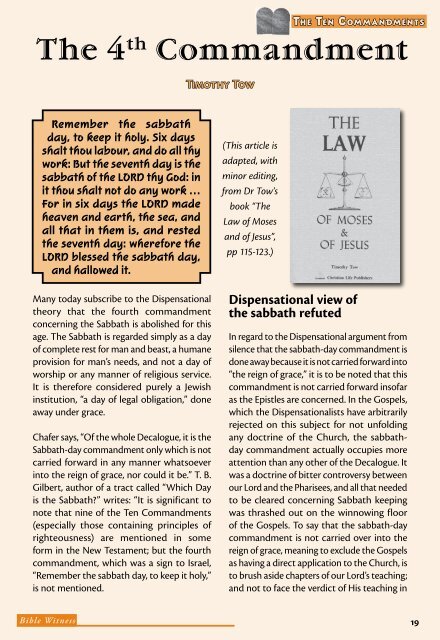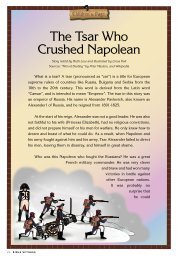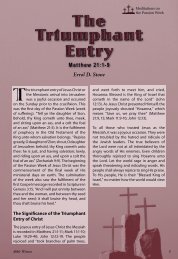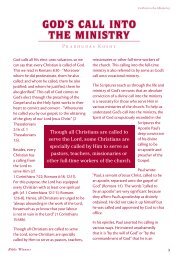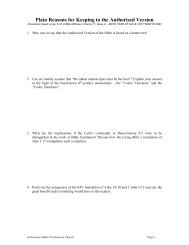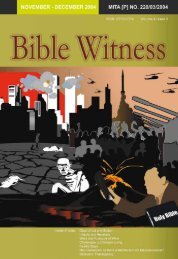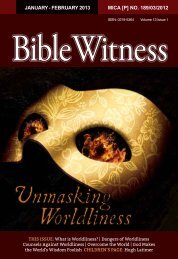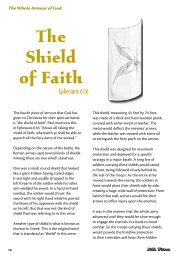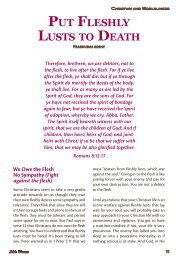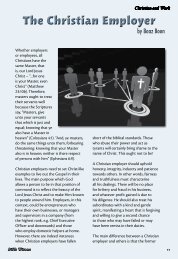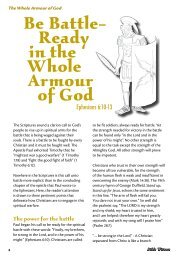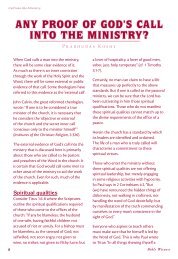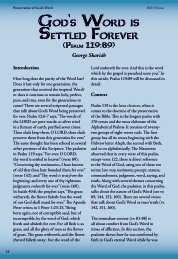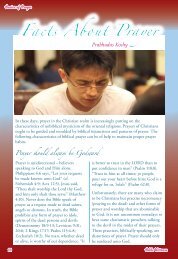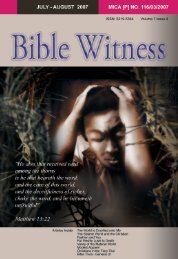The 4th Commandment - Bible Witness
The 4th Commandment - Bible Witness
The 4th Commandment - Bible Witness
Create successful ePaper yourself
Turn your PDF publications into a flip-book with our unique Google optimized e-Paper software.
<strong>The</strong> Te n Com m a n dments<strong>The</strong> 4 th <strong>Commandment</strong>Timothy TowRemember the sabbathday, to keep it holy. Six daysshalt thou labour, and do all thywork: But the seventh day is thesabbath of the LORD thy God: init thou shalt not do any work …For in six days the LORD madeheaven and earth, the sea, andall that in them is, and restedthe seventh day: wherefore theLORD blessed the sabbath day,and hallowed it.Many today subscribe to the Dispensationaltheory that the fourth commandmentconcerning the Sabbath is abolished for thisage. <strong>The</strong> Sabbath is regarded simply as a dayof complete rest for man and beast, a humaneprovision for man’s needs, and not a day ofworship or any manner of religious service.It is therefore considered purely a Jewishinstitution, “a day of legal obligation,” doneaway under grace.Chafer says, “Of the whole Decalogue, it is theSabbath-day commandment only which is notcarried forward in any manner whatsoeverinto the reign of grace, nor could it be.” T. B.Gilbert, author of a tract called “Which Dayis the Sabbath?” writes: “It is significant tonote that nine of the Ten <strong>Commandment</strong>s(especially those containing principles ofrighteousness) are mentioned in someform in the New Testament; but the fourthcommandment, which was a sign to Israel,“Remember the sabbath day, to keep it holy,”is not mentioned.(This article isadapted, withminor editing,from Dr Tow’sbook “<strong>The</strong>Law of Mosesand of Jesus”,pp 115-123.)Dispensational view ofthe sabbath refutedIn regard to the Dispensational argument fromsilence that the sabbath-day commandment isdone away because it is not carried forward into“the reign of grace,” it is to be noted that thiscommandment is not carried forward insofaras the Epistles are concerned. In the Gospels,which the Dispensationalists have arbitrarilyrejected on this subject for not unfoldingany doctrine of the Church, the sabbathdaycommandment actually occupies moreattention than any other of the Decalogue. Itwas a doctrine of bitter controversy betweenour Lord and the Pharisees, and all that neededto be cleared concerning Sabbath keepingwas thrashed out on the winnowing floorof the Gospels. To say that the sabbath-daycommandment is not carried over into thereign of grace, meaning to exclude the Gospelsas having a direct application to the Church, isto brush aside chapters of our Lord’s teaching;and not to face the verdict of His teaching in<strong>Bible</strong> <strong>Witness</strong>19
<strong>The</strong> Te n Com m a n dmentssuch a case is to renounce the jurisdictionof a section of the Word of God. Is not “allscripture given by inspiration of God” and“profitable for doctrine”? (2 Timothy 3:16).Since the teaching of Jesus, whether recordedin the Sermon on the Mount or elsewherein the Gospels, binds the Church in doctrineand practice, the Dispensational argumentfrom silence must be considered to beuntenable. However, before the verdict ofJesus is sought, the Pauline “proof texts” onthe Sabbath questionrequire preliminaryexamination.<strong>The</strong> first passage ofScripture quoted bythe Dispensationalistsfor the abrogationof the Sabbath isColossians 2:16-17:“Let no man thereforejudge you in meat, orin drink, or in respectof an holyday, or ofthe new moon, orof the sabbath days:Which are a shadowof things to come;but the body is ofChrist.”<strong>The</strong> Gentile Christianswere not only released from keeping Jewishfood laws, except that they should “abstainfrom meats offered to idols, and from bloodand from things strangled” (Acts 15:29), butthey were freed also from the rest of theceremonial laws. Paul reiterated here thatGentile Christians were not bound by Jewisheating traditions, so the Gentile Churchwas under no obligation to keep the wholegamut of Jewish religious days. <strong>The</strong> first dayof the week around which they gathered forworship in the tradition of the Apostles wasall-sufficient. <strong>The</strong> point at issue here was thekeeping of Jewish festive days and not theprinciple of Sabbath or holy rest! How can itbe substantiated that the Sabbath principlewas not the point at issue? Elicott observesthat “of the new moons or of the sabbaths” inColossians 2:16 is a direct allusion to the “newmoons and sabbaths” mentioned in Isaiah 1:13,14; Ezekiel 45:17 and Hosea 2:11. For example,Hosea 2:11 says, “I will also cause all her mirth tocease, her feast days,her new moons, andher Sabbaths, and allher solemn feasts.”<strong>The</strong> Sabbaths inthese contextsevidently refer notonly to the weeklySabbath Days, butalso to those ofspecial occasions inthe Jewish calendar,such as, the Dayof Atonement.<strong>The</strong>refore theinherent Sabbathprinciple is notthe object of theApostle’s discussion.Albert Barnes fullyconcurs with thisinterpretation witha more detailed commentary as follows:<strong>The</strong> word Sabbath in the Old Testament isapplied not only to the seventh day but to allthe days of holy rest that were observed by theHebrews, and particularly to the beginning andclose of the great festivals. <strong>The</strong>re is doubtlessreference to those days in this place, as theword is used in the plural number, and theApostle does not refer particularly to theSabbath so called. <strong>The</strong>re is no evidence from20<strong>Bible</strong> <strong>Witness</strong>
<strong>The</strong> Te n Com m a n dmentsthis passage that he could teach there wasno obligation to observe any holy time, forthere is not the slightest reason to believethat he meant to teach that one of the tencommandments had ceased to be bindingon mankind. If he had used the word in thesingular number “<strong>The</strong> Sabbath,” it would then,of course, have been clear that he meant toteach that the commandment had ceased tobe binding, and that a Sabbath was no longerto be observed. But the use of the term inplural number, and the connections showthat he had his eye on the great number ofdays which were observed by the Hebrewsas festivals, as a part of their ceremonial andtypical law, and not to the moral Law, or theten commandments could be spoken of asa ‘shadow of good things to come.’ <strong>The</strong>secommandments are from the nature of moralLaw, of perpetual and universal obligation.A modern analogy of this situation is thecriticism by Reformed Christians of thekeeping of the Sabbath on Saturday bySeventh-Day Adventists without any intentionof abrogating the principle of the Sabbath,naturally inherent in the Lord’s Day.<strong>The</strong> second “proof text” used byDispensationalists to abrogate the Sabbathprinciple is Galatians 4:9, 10. “But now, afterthat ye have known God, or rather areknown of God, how turn ye again to weakand beggarly elements, whereunto ye desireagain to be in bondage? Ye observe days, andmonths, and times, and years.”In this passage, no Sabbath is mentioned atall, though it must be admitted that Sabbathdays may be hinted. Hermann Olshausencomments, “<strong>The</strong> hJme÷raß(days) are, it maybe supposed, the Sabbaths, mh vnaß (months),the new moons, kairou/ß / (times), longerfestival seasons, Easter, Pentecost, the feast ofTabernacles, which were celebrated for eightdays successively, eṅiautou/ß (years), in fine,the years of jubilee. <strong>The</strong> first three seasons arealso adduced in Colossians 2:16. Finally thesolemnization in itself is not blamed (eventhe early church had its festivals): but thesuperstitious belief, that it was necessary tosalvation.<strong>The</strong> third and final passage cited against theSabbath that will be considered in this articleis Romans 14:5: “One man esteemeth one dayabove another: another esteemeth every dayalike. Let every man be fully persuaded in hisown mind.” This verse of Scripture has noreference to the doing away with the Sabbathprinciple. Rather it gives liberty to observeor not to observe the Jewish Sabbath Dayduring the period of transition of the ChristianChurch. Charles Hodge’s commentary, withreference also to Colossians 2:16 and Galatians4:10, sums up the teaching of the threepassages succinctly as follows:“As the law of Moses not only made a distinctionbetween meats as clean and unclean, but alsoprescribed the observance of certain days asreligious festivals, the Jewish converts wereas scrupulous with regard to this latter pointas the former. Some Christians, therefore,thought it incumbent on them to observethese days; others were of a contrary opinion.Both were to be tolerated. <strong>The</strong> veneration ofthese days was a weakness; but still it was nota vital matter, and therefore should not beallowed to disturb the harmony of Christianintercourse, or the peace of the church. It isobvious from the context, and from suchparallel passages as Galatians 4:10, ‘Ye observedays, and months, and times, and years’, andColossians 2:16, “Let no man therefore judgeyou in meat, or in drink, or in respect ofan holy day, or of the new moon, or of thesabbath days”, that Paul has reference to the<strong>Bible</strong> <strong>Witness</strong>21
<strong>The</strong> Te n Com m a n dmentsJewish festivals, and therefore his languagecannot properly be applied to the ChristianSabbath.”This commentary brings the preliminaryexamination of the Dispensational “prooftexts” to a close. <strong>The</strong> remaining part ofthis article will take usto the Gospels to hearthe verdict from thelips of our Lord. Beforereceiving this verdictfrom Him, there is oneimportant principle ofhermeneutics that mustbe borne in mind: theFourth <strong>Commandment</strong>is one of the Ten Wordswritten by the finger ofGod amidst the thunderand lightning of Sinai andkept in the Ark in theHoly of Holies. No one,in heaven or on earth, isworthy to change an iotaof this commandmentother than He who is “theLord of the Sabbath”.<strong>The</strong> verdict of Jesus onsabbath keepingIf there was a law that the Pharisees consistentlyexploited to “entangle” our Lord, it was thelaw of the Sabbath. In the foreordination ofGod, this law was used to “entangle” Him forgood, for out of the contention between the“lawyers” and the Master, there is preservedfor this age a full exposition of the doctrineof the Sabbath.First, the Sabbath principle of holy rest is morethan ever upheld for the Gospel Dispensationby the example of our Lord. In all theaccusations brought against Him in the matterof Sabbath keeping, there was not one thatcharged Jesus or His disciples for doing secularwork as on weekdays. Our Lord travelled longdistances during His preaching ministry, andHis disciples caught fish to support themselvesand their families, but they were neveraccused of taking more than a Sabbath Day’sjourney, or for catching fish or drying nets onthe Sabbath Day. All that the Pharisees couldfind fault with, on a technical basis, was oneminor incident — plucking and eating corn byHis disciples in the cornfields on the SabbathDay. This is a small incident, but it tells amighty story! It strongly suggests that apartfrom this event, our Lord and His discipleshad so faithfully observed the Sabbath thatthe Pharisees could bring no charge againstthem. This is not an argument from silencebecause Jesus was maliciously accused on fourother occasions, viz., the healing of the manwho had an infirmity for thirty-eight years(John 5:1ff), the healing of the man with awithered hand (Matthew 12:9ff), the healing22<strong>Bible</strong> <strong>Witness</strong>
<strong>The</strong> Te n Com m a n dmentsof the man born blind (John 9:1ff), and thehealing of the woman with a spirit of infirmityfor eighteen years (Luke 13:10). On none ofthese occasions, could He be convicted fordoing weekday secular work.With regard to the accusation of plucking andeating corn in the cornfields on the SabbathDay, our Lord declared that His disciples were“guiltless” (Matthew 12:7). However, He didnot exonerate them without a good reason.As a Lawyer of lawyers, He proceeded to pleadthe cause of extenuating circumstances whichfound a precedent in two established cases.(1) <strong>The</strong> disciples plucked and ate corn inthe cornfields on the Sabbath Day becausethey were hungry. This was permissible bythe example of David and his men who ateshewbread when they were hungry which,under normal circumstances, they were notpermitted to eat. <strong>The</strong>refore the law of theSabbath must yield to the law of preservationof human life, which was summed up in themaxim, “<strong>The</strong> sabbath was made for man, andnot man for the sabbath.” By this principle, ourLord healed on the four occasions cited above,and He showed that this action was furthersubstantiated by the law of nature. In reply tothose who criticized Him for healing the manwith a withered hand on the Sabbath Day,Jesus said: “What man shall there be amongyou, that shall have one sheep, and if it fall intoa pit on the sabbath day, will he not lay holdon it, and lift it out? How much then is a manbetter than a sheep? Wherefore it is lawfulto do well on the sabbath days” (Matthew12:11ff).<strong>The</strong> law of “the sabbath was made for man andnot man for the sabbath,” however, is never tobe used as a license to do according to one’spleasure, but “to do well” on the Sabbath Day,<strong>The</strong>refore, it is lawful to visit the sick and helpthe poor on the Sabbath Day, but not to mowone’s lawn or wash one’s car.(2) <strong>The</strong> disciples plucked and ate corn in thecornfields on the Sabbath Day in the courseof their active gospel ministry, and this waspermissible under the exemption accorded topriests who “profaned” the Sabbath (Matthew12:5) by offering sacrifices and circumcising“a man” (John 7:22). <strong>The</strong> law of the Sabbathmust yield to the law of rendering serviceto God. One greater than the Temple is stillgreater than a law of the Temple. <strong>The</strong>refore, itis lawful to travel about on the Sabbath Dayon preaching engagement, but not lawful togo on a picnic.But the resultant teaching from the aforementionedprecepts is the most importantof all. <strong>The</strong> Son of man is “Lord even of theSabbath.” <strong>The</strong>re would not have been aSabbath law if the Lawgiver had not givenit. By virtue of His higher prerogative asLawgiver, it would be justifiable for our Lordto exonerate His disciples with no referenceto the legal precedents whatsoever if He sochooses. That He has power to amend thelaw of the Sabbath, without reference to anylegal precedence, is assuredly hinted by Histhird declaration, “<strong>The</strong> Son of man is Lordeven of the sabbath.”In contrast with the Lordship of Christ, Moses,a faithful servant though he was in God’shouse, had no such power. When certain menwere defiled by the dead body of a man sothat they could not keep the Passover on theappointed day, Moses could not set anotherdate for the defiled men until he had madedue inquiry from the Lord. This is Moses’testimony of his inability to amend the dateof keeping the Passover, except as the Lordwould make a ruling: “And Moses said untothem, Stand still, and I will hear what the Lord<strong>Bible</strong> <strong>Witness</strong>23
<strong>The</strong> Te n Com m a n dmentswill command concerning you. And the Lordspake unto Moses saying, Speak unto thechildren of Israel, saying, If any man of you orof your posterity shall be unclean by reasonof a dead body, or be in a journey afar off, yethe shall keep the passover unto the Lord. <strong>The</strong>fourteenth day of the second month at eventhey shall keep it. . . .” (Numbers 9:6ff).<strong>The</strong> fourteenth day of the second monthis one month after the regular date of thepassover, which falls on the fourteenth dayof the first month (Numbers 9:3). He whois “Lord even of the Sabbath” was He whoamended the Passover!If the Lord alone had any power to amend aholy day in the Old Dispensation, then noneever changed the Sabbath from Saturdayto Sunday for the New except the LordHimself. It is true the <strong>Bible</strong> records no explicitcommand from His lips, but His appearanceson the first two consecutive Sundays after theresurrection to bless the disciples assembledfor worship, strongly attest to His sanction(John 20:19ff). Why did our Lord appear onthe first two consecutive Sundays to bless thedisciples in worship? Because two is the leastnumber required of a lawful witness: “ . . . . inthe mouth of two or three witnesses everyword may be established.”<strong>The</strong> first day of the week that the Lord of theSabbath established for Christian worship isproperly called the Lord’s Day (Revelation1:10). It is right that the Lord’s Day should bea Sabbath Day also by the divine principlethat every holy day apart from the SabbathDay, under the Mosaic Dispensation, mustbe kept as a Sabbath Day. How much moremust the Lord’s Day, in commemoration ofthe finished work of redemption, be set asideas a Sabbath Day of worship and witness. Itis therefore called by reformed theologiansthe Christian Sabbath. Those who hold to theDispensational view that the Lord’s Day is inno way connected with the Sabbath Day ofthe Old Dispensation, nor should holy restbe required for this Day in the worship andservice of God, should consider our Lord’sview on Sabbath keeping.It is finally submitted that this syntheticview of the Sabbath Day as transferred fromthe seventh day to the first by the implicitcommand of our Lord is consistently taughtby the Westminster Confession, as follows:“As it is of the law of nature, that, in general,a due proportion of time be set apart for theworship of God, so, in his Word, by a positive,moral, and perpetual commandment, bindingall men in all ages, he hath particularlyappointed one day in seven for a Sabbath,to be kept holy unto him: which, from thebeginning of the world to the resurrectionof Christ, was the last day of the week, whichin Scripture is called the Lord’s Day, and tobe continued to the end of the world as theChristian Sabbath.”“This Sabbath is then kept holy unto the Lord,when men, after a due preparing of theirhearts, and ordering of their common affairsbeforehand, do not only observe an holy restall the day from their own works, words, andthoughts, abouttheir worldlye m p l oy m e n t sand recreationsbut also are takenup the wholetime in public andprivate exerciseof his worship,and in the dutiesof necessity andmercy.” •24<strong>Bible</strong> <strong>Witness</strong>


